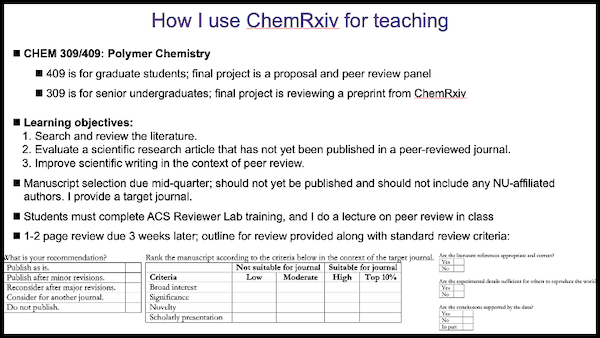In August 2022, ChemRxiv organized a panel discussion at the ACS Fall Meeting in Chicago. We sat down with one of the panelists, Julia Kalow, Assistant Professor of Chemistry at Northwestern University, to find out more about how she utilizes ChemRxiv in her lab.

Can you tell us a bit about your research focus?
We are organic and polymer chemists interested in controlling the synthesis and properties of polymers with light. I'm interested in looking at materials that change over time, under stimuli or during reactions, through the lens of "reactivity-property relationships", which we think of as a dynamic version of conventional structure-property relationships.
You’ve posted a number of preprints onto ChemRxiv. When did you first learn about preprints and ChemRxiv?
Several of my senior colleagues, such as Will Dichtel and Franz Geiger, were early adopters, and their enthusiasm convinced me to use it.
What do you see as the main benefit of posting a preprint?
As an early-career scientist, I need to be able to show the community what we're working on, even as our manuscripts are making their way through the (often slow) peer-review and revision process. This is particularly true since I have switched fields, and for proposals, preprints can demonstrate our expertise in a new area while we are waiting for the final published version to come out.
What has the reception been like to your work on ChemRxiv?
Some of our preprints have been cited, and while it's hard to know how "views" translates to actual reading or impact, it is interesting that some of our preprints have been viewed more times than the published version!
You mentioned at the event at the ACS National meeting that you also use preprints in your teaching, can you tell us more about how you do that?
In my Polymer Chemistry course, for the final project, the senior undergraduates in the class pick a preprint from ChemRxiv related to polymer chemistry and prepare a peer review for it. As preparation, they complete the ACS Reviewer Lab training and I do a lecture on peer review during class, and I also provide a template for their reviews. I think that preprints are the perfect context for this exercise because they are actually reviewing manuscripts that may not have been through the review process, and need to make a judgement call that is divorced from the perceived prestige or impact of a journal.
